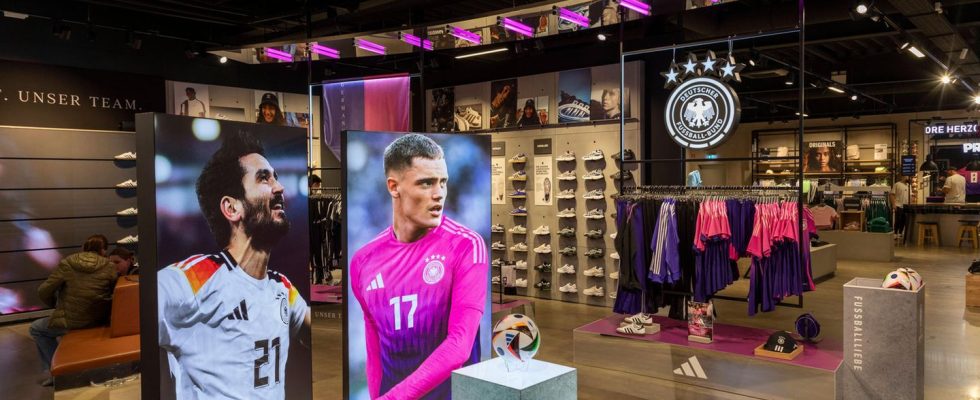Adidas out
DFB announces equipment deal – and Nike shares collapse
From 2027, the players of the German national teams will wear Nike instead of Adidas
© Harry Koerber / Imago Images
Shortly before the start of the home European Championship, the DFB announced that Nike would replace Adidas as the supplier. The US company’s shares then plummeted – but that’s not the only reason.
National soccer coach Julian Nagelsmann just held up the new pink-on-purple Adidas jersey for his national team to the cameras. Now, completely unexpectedly, this news bursts in: The decades-long partnership with Adidas will end and US competitor Nike will take over the DFB teams from 2027.
At first glance, investors on the stock market don’t seem to like this. The US sporting goods manufacturer’s share price fell by almost seven percent on Friday morning and did not rise again until midday. But does the deal with the German Football Association (DFB) really shock investors that much?
Nike shares down almost seven percent
The DFB announced the new partnership on Thursday, saying that Nike had “made by far the best economic offer.” As the “Handelsblatt” reports from industry circles, the group is expected to pay the DFB more than 100 million euros per year. That would not only be more than twice as much as Adidas has previously paid the DFB, but calculated over the planned contract term of eight years, it would be an investment of almost 1 billion euros in German football.
Investors may question this. After all, neither the men’s nor the women’s national teams have been going well lately; their popularity among the population was already greater. Higher costs in the future and the question of whether an investment is worthwhile for the company can certainly influence share prices. Normally, the majority of shareholders only look at the next 12 to 18 months.
The fact that the share price has collapsed probably has very little to do with the DFB deal and more to do with the quarterly figures that Nike presented on Thursday. Sales development was better than expected, but the company has been preparing its investors for weaker sales in the future for some time. After the US stock market closed, CFO Matthew Friend announced that sales in the first half of the new fiscal year were likely to shrink by a low single-digit percentage.
Nike’s new direct sales strategy is not driving growth as expected and in order to save costs, the company wants to reduce its franchise business in the future. Overall, Nike earned $1.17 billion in the third quarter, five percent less than a year ago. These statements – better business than expected, but muted expectations for the future – are currently being heard more frequently. However, this usually leads to negative price reactions.
Adidas and Puma were the biggest losers in Frankfurt on Friday morning
The US giant’s gloomy expectations also had an impact on German sporting goods manufacturers. Adidas shares slipped by around 1.5 percent on Friday morning, making them the biggest loser in the Dax. Of course, the DFB’s move to Nike could also have something to do with this, but Puma shares, which should theoretically be unaffected by this, even lost three percent at times. It is more likely that investors will draw conclusions from Nike’s problems to others, thereby devaluing Adidas and Puma.
How the Nike-DFB deal actually affects share prices will only become apparent later. After all, Adidas was at the DFB’s side for more than 70 years, and the vast majority of German World Cup and European Championship winners wore jerseys from the German manufacturer. Adidas only briefly commented on the DFB’s decision; they were only informed about the new supplier by the DFB at short notice.
16 images
Interestingly, Nike hasn’t communicated much about it yet, quite the opposite. There is no official press release until Friday afternoon, only a short statement from CEO John Donahoe from a telephone conference with analysts after the quarterly figures were presented. He celebrated the deal as a sign of strength and poked fun at rival Adidas. It is “great proof that when we do our best, no one can beat us.”
Despite recent poor performances, Nike said the DFB is “a legendary global force in football that shares our passion for the sport.” The group therefore sees potential for new products, particularly in women’s football and the lifestyle business.



